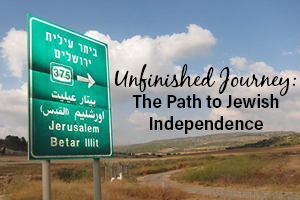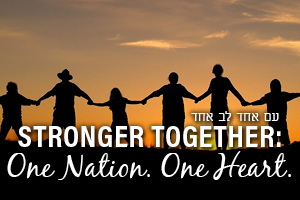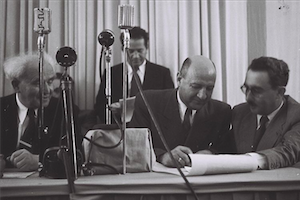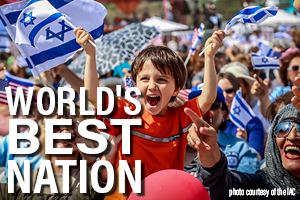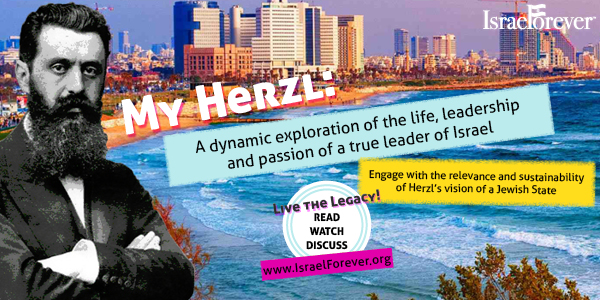The 21st Century Universal Goal for the Jewish People
By Ethan K
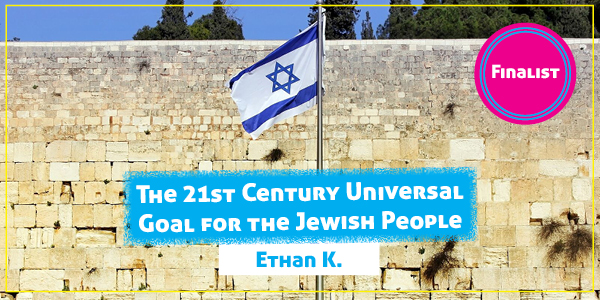
Herzl’s dream was fulfilled but not completed - what is the 21st century universal goal for the Jewish people?
As a 16-year-old Jewish teen born and raised in the U.S., my ideas of Zionism, my love for Israel and what this means in the context of Herzl’s dream and “unfinished dream” is a seemingly herculean matter of reflection. My background, which informs my thoughts and opinions, must first be outlined.
Both my grandfathers are Israeli. My father’s father was born in Mandate Palestine in 1945 in Givatayim. His father emigrated legally into Palestine, prior to the White Paper, in the 1930s, an ardent Zionist with HaShomer Hatza’ir, leaving behind his poor and religious family in their small shtetl west of Lodz, Poland.
He fought in the Palmach, where his main responsibility was hiding smuggled weapons. My father’s grandmother also an ardent Zionist with HaShomer Hatza’ir, bribed her way into Palestine, departing Minsk, Belarus, and a life of wealth and comfort. When I look back on why they both came alone to the Land of Israel, before Hitler, I am amazed and admire them for leaving all they had known all because of the Zionist idea. What an enormously powerful idea it must be.
In stark contrast, my mother’s father was born in Kazakhstan in 1944, after his parents somehow survived Hitler by fleeing from Chelm, Poland several years earlier. They returned to Europe in 1945 only to find themselves herded into a displaced persons camp in Austria where my mother’s father lived till the age of 5.
His identification card pathetically labeled his nationality as “No State”, prior to being brought to Israel as a post-war refugee in 1949. He then lived a few years in a tent city before finally growing up in Yavne’el. His family was the beneficiary of the State of Israel’s raison d’être, the “ingathering of the exiles”, the main reason Ben-Gurion gave for Israel’s founding and rebirth.
Both my grandfathers served in the IDF. Both emigrated to the U.S. in the 1960s after the army for purely economic reasons. My mother’s father was a paratrooper and returned to Israel briefly in 1973 to defend Israel, fighting in the Sinai.
I have both Ashkenasi and Sephardic heritage. My bar mitzvah was done at the Western Wall. My parents are both proud American Jews who raised me to be a proud Jew and ardent supporter of Israel. In my high school in Scottsdale, Arizona I am one of very few Jews, though I have become “the Jew” and source of information on Judaism and Israel to my friends and even faculty.
I have vocally defended Israel and Judaism on numerous occasions against a particular anti-Semitic student who spreads Hamas propaganda among her friends, over social media, and even writing essays against Israel. As such, I see this essay as my chance to increase the love for Israel in young Jews of my generation.
It’s ironic that Herzl’s foundational realization about the status of Jews in late 19th century Europe persists today in the US, in other global Jewish communities and even in Israel itself. Herzl acknowledged in his book Der Judenstaat that he was not inventing a new idea. His idea of creating an independent Jewish entity by Jews and for Jews, was an old idea. But the disturbing realization that moved him was anti-Semitism, all around him, in seemingly modern “educated Europe” of Germany, France, and Austria.
Herzl read anti-Semitic writings by popular German and French authors and witnessed the disgraceful trial of the Jewish French army officer Alfred Dreyfuss, falsely accused of being a German traitor. Why, Herzl asked, was it that one hundred years after Emancipation, social integration, and abandoning religious practices that anti-Semitism did not disappear with Jewish assimilation but was heightened and even more ferocious? He concluded that we Jews are a people, a nation. He stated that we as Jews have:
“...honestly endeavored everywhere to merge ourselves into the social life of surrounding communities and to preserve the faith of our fathers. We are not permitted to do so. In vain we are loyal patriots, our loyalty in some places running to extremes; in vain do we make the same sacrifices of life and property as our fellow-citizens; in vain do we strive to increase the fame of our native land in science and art, or her wealth by trade and commerce...It is useless, therefore for us to be loyalists...If we could only be left in peace...But I think we shall not be left in peace”. (The Jewish State, p.76)
This eerie prediction both presages the destruction of European Jewry, including many of my grandparents’ aunts, uncles, and cousins, but describes the plight, yes, plight of American Jews today. Herzl’s realization of the Jews’ position in exile, also aptly sums up the “problem” with Jews in the United States. In no other land in the history of the world have the Jews achieved such integration, education, influence and apparent acceptance. The intermarriage rate alone, being above 50% itself, is proof. Then why would anti-Semitism be on the rise in the U.S. if we are so integrated? Herzl warns:
"Where Jews now feel comfortable [my opinion] will be violently disputed by them. My happier co-religionists will not believe me till Jew-baiting teaches them the truth, for the longer anti-Semitism lies in abeyance the more fiercely it will break out”.(ibid p.78)
Herzl’s solution of Zionism to save Jews from anti-Semitism was as relevant to 19th century Europe as it is today in the U.S. Despite our broad acceptance and the existence of Israel, anti-Semitism in the U.S. is worse than ever. Why?
The answer is given to us by the rabbis of the Mishnaic period in the Haggadah:
"אלא שבכל דור ודור עומדים עלינו לכלותנו"
"...but in every generation, they rise against us to annihilate us..."
Zionism, and its fruit, the modern State of Israel, has not really solved the scourge of anti-Semitism. The clever wordplay of modern anti-Semites, no matter where they exist, have skillfully transformed the object of their hatred, the Jews, towards Israel instead, cloaking it as “anti-Zionism” but very much still Jew hatred, now 21st century-style. Israel, they say, is “illegal”, “racist”, an “occupier”, instead of the old “Christ killer”, “money lender”, “internationalist”, or “communist”. Same hatred, different century.
The BDS movement itself is the immoral outgrowth of this hatred. In fact, Israel’s existence itself is blamed for this anti-Semitism. “If only the Jew were less Jewish” was the anti-Semitic refrain for 1900 years. Now it’s “if only Israel would do [fill in the blank]” from the finger wagging chorus of anti-Semites like Jeremy Corbyn, Federica Mogherini, Omar Barghouti, UN Durban conference, and more.
Worse, the anti-Semites that want to outright murder Jews, from Fatah, to Hezbollah to Hamas, train their children in their schools and summer camps how and where to stab Jews, and pay the rewards of martyrdom to the families of murderers of Jews. Herzl could not have conceived of this horror. How could it be that the strong modern Jews Herzl dreamed of, Israel, are even more hated than the hook-nosed, hunched-over, weakling Jews of Dark Ages’ Europe? Wasn’t Zionism supposed to end anti-Semitism?
The constant and never-ending yearning for acceptance by the Jews in their lands stands diametrically against the idea of Zionism and Herzl knew this. Jews constantly embrace foreign savior-concepts like Socialism in Russia or Reformed Judaism in Western Europe and the US to mass integrate, to escape “Jewish particularism”, to become like everyone else, in effect to escape Judaism itself. These movements promised the end of anti-Semitism at the price of loss of our peoplehood.
However, the price was paid in massive loss of life to communism, the reaction to communism (Nazism), and massive loss of Jews to intermarriage in Europe and the US. However, I believe there is an even worse manifestation of what happens to Jews when they reside among anti-Semites.
This is a nightmare Herzl did not imagine, that is, Jews becoming themselves enemies of their own people. This is no better illustrated by virulently anti-Zionist “Jewish” groups like If Not Now, and Jewish Voices for Peace, who actively work for Israel’s destruction, and give aid, comfort and cover to Israel’s enemies. The anti-Semitism of these Jews in some ways is more dangerous than that of non-Jews since it create confusion, division, apathy and antipathy towards our own people. This “internal anti-Semitism” rots the bonds of our people from within.
The fragility of the Jewish nation was felt firsthand by the generation of 1948. But many in our generation not only take Israel for granted but create moral equivalency between Israel and its neighboring enemies. The radical anti-Zionist Jews have internalized the anti-Semitic attitudes of our enemies. Senator Daniel Moynihan taught that morality is not subjective, so when the enemy wishes to murder you and your children in their beds, build tunnels under schools, fire rockets, promote stabbing sprees, idolize suicide bombers, it is terrorism and not “freedom fighting”. “Jewish” support for these murderers is beyond destructive.
This raises tough questions: How can Zionism overcome this and fulfill Herzl’s dream? Where does Zionism come from and why should we care?
The name Zion is mentioned 154 times in the Hebrew Bible. The name Jerusalem is mentioned in the Hebrew Bible 626 times. Jerusalem, by contrast, is mentioned zero times in the Koran. Jerusalem, Zion, has always been a Jewish concept, a Jewish city, and was never the capital of any other people over the thousands of years since its founding by King David in 1000 BCE.
The prophet Isaiah foretold destruction and also the redemption of the Jewish people from Zion and to Zion. Zionism is a direct outgrowth of Judaism, not the replacement of it. The return to Zion, as Herzl’s said, is an old idea. Zecharyah the prophet said, it is G-d who first returns to Jerusalem, and only then can it be built up, in Chapter 1: כה אמר ה' צבקות קנאתי לירושלים קנאה גדולה. Does this make G-d then the First Zionist? Should we try to see G-d’s desire fulfilled through Herzl himself?
Despite much early vocal religious resistance to secular Zionism, the early halutzim were fulfilling the mitzvah of living in Israel. It was only when attacked by outside invaders that the Jews prevailed in a defensive war. In this manner, modern secular Zionism led to the re-establishment of our sovereignty in the Land of Israel, following halacha cited by Ramban and avoiding the Talmudic prohibition of storming the land from the outside.
This makes Zionism halachically kosher. But at the same time, it is the social and political way we as Jews must perpetuate our history, our religion and our heritage to the next generation. Temple-centered Judaism dominated for approximately 1000 years. Piety within the structure of Talmudic Judaism then carried us through the next 1900 years of wilderness. Now we are participants in a new era of Judaism with Zionism as the banner.
Judaism gives Zionism its foundation and justification. That’s why anti-Semites despise Zionism and Israel. Dare I say Herzl was wrong to think Zionism would end anti-Semitism? Without Judaism there is no Zionism. Without Zionism there is no Israel. Anti-Semites realize this and strive to separate Jews from our religion. The anti-Zionist messaging in our modern age is disguised as BDS and universal social justice which are anti-Semitic to their core.
Without Zionism and Israel to be the beacon, pride, and future of the Jews, the global Jewish communities have no anchor. Zionism and Israel are now more than ever needed by this generation of Jews to fight anti-Semitism in their local communities, around the world, and to fight the lies of BDS that poisons the minds of this generation. This is the next step in Herzl’s dream, the continued battle for maintaining Zionism and Israel. As such, Herzl’s dream is more the natural continuation of Jewish national pride, not the invention of something new.
We young Jews must defend our inheritance and “never forget” the sacrifices of those that have fallen in all of Israel’s wars, the Holocaust, the pogroms, the expulsions, the book burnings, the mass conversions. Modern Israel is Part 2 of Herzl’s Zionism, for the continuity of the Jewish people. Jews have always fought to defend Jerusalem, Zion, during the times of the Assyrians, Babylonians, and Greeks, against the Romans twice, in 1948, and finally in 1967. These ancient and modern Jewish fighters are an enormous source of Jewish pride for me. This pride must be shared and supported openly and courageously.
More positively, I also see Zionism as having forever broken the superficial Jewish caste system of religious vs. secular, of Ashkenasi vs. Sephardi vs. Mizrahi vs. Ethiopian, and has drawn the Jews back into a unifying entity. Our generation must keep this unifying Jewish mass merger going to fulfill Part 2 of Herzl’s dream, and promote Zionism as the glue. Whether in ancient or modern times, the unity of the Jewish people has rarely been more evident or dedicated to one goal, finally realized in 1948.
Israel has become a dominant global force in military and security, medicine, agriculture, science, and water technology. Israel has its own colorful modern Hebrew language, with award-winning Netflix series, music, art, and sports figures. It drills its own natural gas. It hosts international conferences. It has become a separate and self-sustaining social entity, a miracle success story that is admired and emulated by many, and the object of jealousy by others. Zionism made that all happen.
In conclusion, Zionism is divinely inspired, but manifests through the hands of Jews who cling to their pride of peoplehood, and fight for their history. Zionism is distilled from Judaism, and Israel is proof of G-d’s Will in our modern age. Just as the Jewish people were self-scolding for violating G-d’s law and bore the burden of persecution and exile for centuries, so too we must recognize the merit of G-d granting us the miracle of overcoming our enemies and causing our people to thrive.
The lesson of Herzl’s dream is that anti-Semitism is our constant adversary and we must treat Zionism as both a cherished blessing and a tool to repel our enemies and prevent self-loathing. Herzl’s 21st century, unfinished dream is to re-invigorate the love of Zionism and Israel to avoid reverting to the vulnerable state we Jews embodied for centuries.
Though every Jew around the world cannot live in Israel, every Jew around the world can love and support Israel and be its champion. I am Herzl’s legacy. Like him I am a proud Jew living outside the Land, who may one day live there, but a Jew who loves his people, supports the idea of Israel, elevates Zionism, and fights against anti-Semitism.
Our generation must adopt Herzl’s Jewish pride and pragmatism about the world we inhabit. If we Jews don’t do it, who will? But if I do, I know many will follow.

